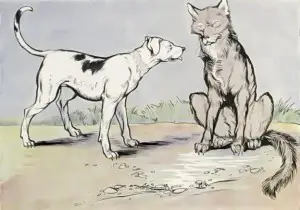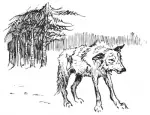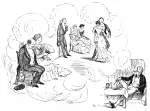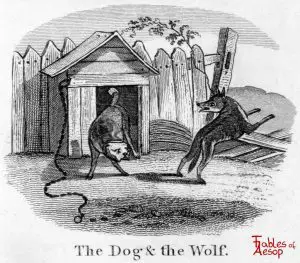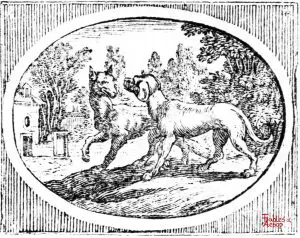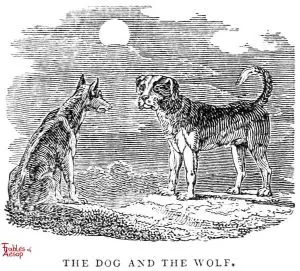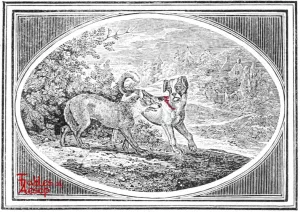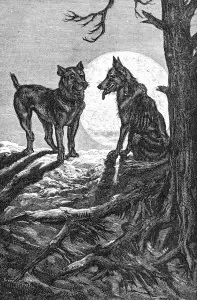A Dog offered to help a Wolf get regular feed from his Master. The Wolf listened but saw a bald spot on Dog’s neck where the collar sat. Goodbye said Wolf.
Better starve free than be a fat slave.

Aesop For Children (The Wolf and The House Dog)
There was once a Wolf who got very little to eat because the Dogs of the village were so wide awake and watchful. He was really nothing but skin and bones, and it made him very downhearted to think of it.
One night this Wolf happened to fall in with a fine fat House Dog who had wandered a little too far from home. The Wolf would gladly have eaten him then and there, but the House Dog looked strong enough to leave his marks should he try it. So the Wolf spoke very humbly to the Dog, complimenting him on his fine appearance.
“You can be as well-fed as I am if you want to,” replied the Dog. “Leave the woods; there you live miserably. Why, you have to fight hard for every bite you get. Follow my example and you will get along beautifully.”
“What must I do?” asked the Wolf.
“Hardly anything,” answered the House Dog. “Chase people who carry canes, bark at beggars,[Pg 83] and fawn on the people of the house. In return you will get tidbits of every kind, chicken bones, choice bits of meat, sugar, cake, and much more beside, not to speak of kind words and caresses.”
The Wolf had such a beautiful vision of his coming happiness that he almost wept. But just then he noticed that the hair on the Dog’s neck was worn and the skin was chafed.
“What is that on your neck?”
“Nothing at all,” replied the Dog.
“What! nothing!”
“Oh, just a trifle!”
“But please tell me.”
“Perhaps you see the mark of the collar to which my chain is fastened.”
“What! A chain!” cried the Wolf. “Don’t you go wherever you please?”
“Not always! But what’s the difference?” replied the Dog.
“All the difference in the world! I don’t care a rap for your feasts and I wouldn’t take all the tender young lambs in the world at that price.” And away ran the Wolf to the woods.
Moral
There is nothing worth so much as liberty.

Caldecott
A Wolf, seeing a large Dog with a collar on, asked him: “Who put that collar round your neck, and fed you to be so sleek?” “My master,” answered the Dog. “Then,” said the Wolf, “may no friend of mine be treated like this; a collar is as grievous as starvation.”

Jefferys Taylor
A WOLF there was whose scanty fare
Had made his person lean and spare:
A dog there was, so amply fed,
His sides were plump and sleek, ’tis said;
The wolf once met this prosp’rous cur,
And thus began:—”Your servant, sir;
I’m pleased to see you look so well,
Though how it is, I cannot tell;
I have not broke my fast to-day;
Nor have I, I’m concerned to say,
One bone in store or expectation,
And that I call a great vexation.”
“Indeed it is,” the dog replied;
“I know no ill so great beside;
But if you do not like to be
So poorly fed, come live with me.”
“Agreed,” rejoined the wolf, “I’ll go:
But pray what work am I to do?”
“O, guard the house, and do not fail
To bark at thieves and wag your tail.”
So off they jogg’d, and soon arrived
At where the friendly mastiff lived,
Well,” said the wolf, “I can’t deny
You have a better house than I.”
“Not so,” the other then replied,
“If you with me will here abide.”
“Oh!” said the wolf, how kind you are!
But what d’ye call that hanging there?
Is it an iron chain, or what?”
“Friend,” said the dog, “I quite forgot
To mention that:—sometimes, you see,
They hook that little chain to —me;
But it is only meant to keep
Us dogs from walking in our sleep,
And should you wear it, you would find,
It’s nothing that you need to mind.”
“I’ll take your word,” the wolf replied;
“Its truth by me shall ne’er be tried;
I’ll have my liberty again,
And you your collar and your chain.”
Our neighbours sometimes seem to be
A vast deal better off than we;
Yet seldom ’tis they really are,
Since they have troubles too to bear,
Which, if the truth were really known,
Are quite as grievous as our own.

Samuel Croxall
A LEAN, hungry, half-starved Wolf happened, one moon-shiny night, to meet with a jolly, plump, well-fed Mastiff: and, after the first compliments were passed, says the Wolf, You look extremely well; I protest, I think I never saw a more graceful, comely person; but how comes it about, I beseech you, that you should live so much better than I? I may say without vanity, that I venture fifty times more than you do; and yet I am almost ready to perish with hunger. The Dog answered very bluntly, Why, you may live as well, if you will do the same for it that I do. Indeed! What is that: says he: Why, says the Dog, only to guard the house a-nights; and keep it from. thieves. With all my heart, replies the Wolf; for at present I have but a sorry time of it; and I think to change my hard lodging in the woods, where I endure rain, frost, and snow, for a warm roof over my head; and a belly-full of good victuals will be no bad bargain. True, said the Dog; therefore you have nothing more to do than to follow me. Now, as they were jogging on together, the Wolf spied a crease in the Dog’s neck, and, having a strange curiosity, could not forbear asking him what it meant! Pugh! nothing, says the Dog.
Nay, but pray, says the Wolf. Why, says the Dog, if you must know, I am tied up in the day-time, because I am a little fierce, for fear I should bite people, and am only let loose a-nights. But this is done with design to make me sleep a-days, more than any thing else, and that I may watch the better in the night-time; for, as soon as ever the twilight appears, out I am turned, and may go where I please. Then my master brings me plates of bones from the table with his own hands; and, whatever scraps are left by any of the family, all fall to my share; for you must know I am a favourite with every body. So you see how you are to live. Come, come along; what is the matter with you? No, replied the Wolf, I beg your pardon; keep your happiness all to yourself. Liberty is the word with me; and I would not be a king upon the terms you mention.
THE APPLICATION
The lowest condition of life, with freedom attending it, is better than the mosi exalted station under a restraint. Aesop and Phaedrus, who had both felt the bitter effects of slavery, though the latter of them had the good fortune to have the mildest prince that ever was for his master, cannot forbear taking all opportunities to express their great abhorrence of servitude, and their passion for liberty, upon any terms whatsoever. Indeed a state of slavery, with whatever seeming grandeur and happiness it may be attended, is yet so precarious a thing, that he must want sense, honour, courage, and all manner of virtue, who can endure to prefer it in his choice. A man who has so little honour as to bear to be a slave, when it is in his power to prevent or redress it, would make no scruple to cut the throats of his fellow-creatures, or to do any wickedness that the wanton unbridled will of his tyrannical master could suggest.

Thomas Bewick (The Dog and The Wolf)
A Wolf in quest of prey, happened to fall in with a well-fed Mastiff. Ah, Tray, said he, one does not need to ask how you do, you look so plump and hearty. I wish I were as well provided for; but my gaunt looks shew that I fare very differently, although I dare say I venture my life ten times more than you do, in searching for a precarious subsistence, amidst woods and wilds, exposed to rain, and frost, and snow. If you will follow me, replies the Dog, and do as I do, I have no doubt you will change for the better, and soon be in as good plight as I am. The Wolf eagerly requested to be informed what would be required of him. Very little, replied the Mastiff; only drive away beggars, guard the master’s house, caress him, and be submissive to his family, and you will be well fed and warmly lodged. To these conditions the Wolf had no objections; but as they were jogging along, he observed the hair worn off around the Dog’s neck, and enquired the cause. O nothing, answered he, or a mere trifle; perhaps the collar, to which my chain is fastened, has left a mark. Chain! replied the Wolf, with some surprize; so then you are not permitted to go where and when you please? Not always, said Tray; but what does that signify? It signifies so much, rejoined the Wolf, that I am resolved to partake of no sumptuous fare with a chain about my neck; for half a meal, with liberty, is preferable to a full one without it.
APPLICATION.
True greatness of soul will never give up liberty for any consideration whatever; for what are riches, grandeur, titles, or any other worldly good, if they are holden by so precarious a tenure as the arbitrary will of a tyrant! A mere competency, with liberty, is preferable to servitude amidst the greatest affluence; and even the lowest condition in life, with freedom, is better than the most exalted station without it. But liberty in a state of society does not consist in doing whatsoever we please; but only permits those actions by which we do no injustice to our neighbour, or to the community. The well-being of society requires the efforts of all, from the highest to the lowest, to preserve and support it; and since it appears to be the will of Omnipotence, that mankind should live in this state of social union (which does not admit of the unbridled freedom of the savage state) a certain portion of individual liberty must be given up for the good of the whole; but the sacrifice should be bounded by the common good: all beyond approaches towards slavery, and degrades the people who submit to it.

Eliot/Jacobs Version
A gaunt Wolf was almost dead with hunger when he happened to meet a House-dog who was passing by. “Ah, Cousin,” said the Dog. “I knew how it would be; your irregular life will soon be the ruin of you. Why do you not work steadily as I do, and get your food regularly given to you?”
“I would have no objection,” said the Wolf, “if I could only get a place.”
“I will easily arrange that for you,” said the Dog; “come with me to my master and you shall share my work.”
So the Wolf and the Dog went towards the town together. On the way there the Wolf noticed that the hair on a certain part of the Dog’s neck was very much worn away, so he asked him how that had come about.
“Tis but the collar I must wear,” said the Dog.
“Is that all?” said the Wolf. “Then good-bye to you, Master Dog.”

JBR Collection
A Wolf, who was almost skin and bone–so well did the dogs of the neighbourhood keep guard–met, one moonshiny night, a sleek Mastiff, who was, moreover, as strong as he was fat. The Wolf would gladly have supped off him, but saw there would first be a great fight, for which, in his condition, he was not prepared; so, bidding the Dog good-night very humbly, he praised his good looks. “It would be easy for you,” replied the Mastiff, “to get as fat as I am, if you liked. Quit this forest, where you and your fellows live so wretchedly, and often die with hunger. Follow me, and you shall fare much better.” “What shall I have to do?” asked the Wolf. “Almost nothing,” answered the Dog; “only chase away the beggars, and fawn upon the folks of the house. You will, in return, be paid wit h all sorts of nice things–bones of fowls and pigeons–to say nothing of many a friendly pat on the head.” The Wolf, at the picture of so much comfort, nearly shed tears of joy. They trotted off together, but, as they went along, the Wolf noticed a bare spot on the Dog’s neck. “What is that mark?” said he. “Oh, nothing,” said the Dog. “How nothing?” urged the Wolf. “Oh, the merest trifle,” answered the Dog; “the collar which I wear when I am tied up is the cause of it.” “Tied up!” exclaimed the Wolf, with a sudden stop; “tied up! Can you not always, then, run where you please?” “Well, not quite always,” said the Mastiff; “but what can that matter?” “It matters so much to me,” rejoined the Wolf, “that your lot shall not be mine at any price;” and leaping away, he ran once more to his native forest.

Townsend version
A wolf, meeting a big well-fed Mastiff with a wooden collar about his neck asked him who it was that fed him so well and yet compelled him to drag that heavy log about wherever he went. “The master,” he replied. Then said the Wolf: “May no friend of mine ever be in such a plight; for the weight of this chain is enough to spoil the appetite.”

L’Estrange version
There was a hagged carrion of a wolfe, and a jolly sort of a gentile dog, with good flesh upon his back, that fell into company together upon the king’s high-way. The wolfe wonderfully pleas’d with his companion, and as inquisitive to learn how he brought himself to that blessed state of body. Why, says the dog, I keep my master’s house from thieves, and I have very good meat, drink, and lodging for my pains. Now if you’ll go along with me, and do as I do, you may fare as I fare. The wolfe struck up the bargain, and so away they trotted together: but as they were jogging on, the wolfe spy’d a bare place about the dogs neck, where the hair was worn off. Brother (says he) how comes this I prethee? Oh, that’s nothing, says the dog, but the fretting of my collar a little. Nay, says t’other, if there be a collar in the case, I know better things than to sell my liberty for a crust.
Moral
We are so dazzd’d with the glare of a splendid appearance, that we can hardly discern the inconveniences that attend it. ‘Tis a comfort to have good meat and drink at command, and warm lodging: but he that sells his freedom for the cramming of his gutt, has but a hard bargain of it.

Leo et Canis
Occurrit canis leoni et iocatur, “Quid tu, miser, exhaustus inedia, percurris silvas et devia? Me specta pinguem ac nitidum, atque haec non labore consequor, sed otio.” Tum leo, “Habes tu quidem tuas epulas, sed habes stolide etiam vincula. Tu servus esto, qui servire potes; equidem sum liber, nec servire volo.”

Lupus et Canis Saginatus
Lupus, canem videns bene saginatum, “Quanta est,” inquit, “felicitas tua! Tu, ut videtur, laute vivis, at ego fame enecor.” Tum canis “Licet,” inquit, “mecum in urbem venias et eadem felicitate fruaris.” Lupus conditionem accepit. Dum una eunt, animadvertit lupus in collo canis attritos pilos. “Quid hoc est?” inquit; “num iugum sustines? Cervix enim tua tota est glabra.” “Nihil est,” canis respondit, “sed interdiu me alligant ut noctu sim vigilantior, atque haec sunt vestigia collaris quod cervici circumdari solet.” Tum lupus “Vale,” inquit, “amice; nihil moror felicitatem servitute emptam!”
Perry #346
